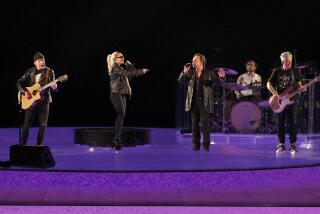Birth of that rattle and hum
- Share via
Like the Beatles, Garth Brooks and so many other mega-sellers before, the members of U2 flunked several auditions before a record company was willing to sign them. In fact, the band’s potential was once viewed as so limited that CBS in England, the label that finally took a chance on the group, reconsidered and dropped it after releasing just two U2 singles.
Thanks to a new, deluxe edition of the quartet’s debut album, “Boy,” we can hear those early recordings and imagine what our vote would have been if we were on the CBS staff.
Though some of the band’s strengths are obvious, several things about the recordings, especially “Out of Control,” remind you so much of David Bowie that CBS execs must have wondered if U2 had any ideas of its own. Three of five songs the band recorded for CBS reappeared on “Boy,” which was released by Island Records, but the Bowie-esque touches had been toned down.
In addition to the CBS tunes, the revealing two-disc package comes with a remastered version of the “Boy” album and inviting extras, including insightful reflections by the Edge.
About “11 O’Clock Tick Tock,” the band’s first single on Island, the U2 guitarist tells us how the band’s drum sound changed dramatically after that record. “The trend of the day,” the Edge writes, “was recording studios without any room reverb or ambience. The playing room at Windmill Lane [studios] was designed to be totally dead, and you can hear it on the drums. It wasn’t until the ‘Boy’ sessions that we figured out that we had to pull the drum kit into the entrance hall, after the receptionist had gone home, to get a decent drum sound. With its three-story stairwell and stone and tiled surfaces, it was a great live room.”
These added features make the deluxe editions of “Boy” and two other new U2 rereleases (“October” and “War”) more valuable than simply the single-disc editions, which offer only the remastered versions of the original albums. Any band wanting to preserve its album history in smart, appealing fashion should use these collections as a model.
U2
“Boy”
Island/Interscope/Universal Music Enterprises
The back story: Powered by Bono’s enchanting vocal and the Edge’s radiant guitar lines, “I Will Follow” was such an immediately appealing calling card for U2 that the band played it twice during its local debut at the old Country Club in Reseda in March 1981.
It’s clear in this collection that U2 was so certain it had a potential classic in “I Will Follow” that it overruled Steve Lillywhite, one of England’s most respected producers.
Lillywhite asked the band to leave the studio during the “I Will Follow” mixing process, which involves balancing the sound level among various instruments. About the moment, the Edge writes, “It didn’t sit well with us not being there, but we were callow 18-year-olds and Steve a veteran of many great records, so we let him do it his way. It’s a great mix, but it was too acoustic-guitar-heavy for us.”
The result was the band sat in with Lillywhite on a second mixing session and made sure the sound emphasized the electric guitar lines that came to define the U2 sound.
U2
“October”
Island/Interscope/Universal Music Enterprises
The back story: This was a nervous time for U2 because the 1981 “October” album didn’t live up to the promise of “I Will Follow,” causing speculation in the industry that U2 had blown its chance. Looking back on the making of the album, the Edge points out in the CD booklet that the band was in desperate shape, partly because Bono’s book of lyrics had been stolen on the tour.
“It was obvious to everyone that we were driving with two wheels over the edge of the cliff, and it drew from us, and particularly Bono, a level of creativity that we had not seen before,” he writes.
U2
“War”
Island/Interscope/Universal Music Enterprises
The back story: This was U2’s creative and commercial breakthrough, thanks to such exquisite and purposeful songs as “New Year’s Day” and “Sunday Bloody Sunday.” Among the extras is a series of remixes of “Two Hearts Beat as One” aimed at dance clubs, a big change for the band. On this point, the Edge writes, “This was in the days before sampling and digital recording, so the scope to reconfigure a track over a dance beat was very limited. However, in these remixes, you can hear where things were headed.”
More to Read
The biggest entertainment stories
Get our big stories about Hollywood, film, television, music, arts, culture and more right in your inbox as soon as they publish.
You may occasionally receive promotional content from the Los Angeles Times.









